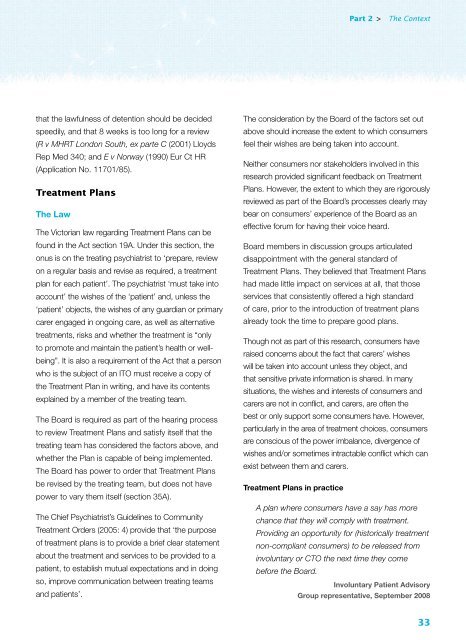Lacking Insight - Community Law
Lacking Insight - Community Law
Lacking Insight - Community Law
- No tags were found...
Create successful ePaper yourself
Turn your PDF publications into a flip-book with our unique Google optimized e-Paper software.
Part 2 > The Contextthat the lawfulness of detention should be decidedspeedily, and that 8 weeks is too long for a review(R v MHRT London South, ex parte C (2001) LloydsRep Med 340; and E v Norway (1990) Eur Ct HR(Application No. 11701/85).Treatment PlansThe <strong>Law</strong>The Victorian law regarding Treatment Plans can befound in the Act section 19A. Under this section, theonus is on the treating psychiatrist to ‘prepare, reviewon a regular basis and revise as required, a treatmentplan for each patient’. The psychiatrist ‘must take intoaccount’ the wishes of the ‘patient’ and, unless the‘patient’ objects, the wishes of any guardian or primarycarer engaged in ongoing care, as well as alternativetreatments, risks and whether the treatment is “onlyto promote and maintain the patient’s health or wellbeing”.It is also a requirement of the Act that a personwho is the subject of an ITO must receive a copy ofthe Treatment Plan in writing, and have its contentsexplained by a member of the treating team.The Board is required as part of the hearing processto review Treatment Plans and satisfy itself that thetreating team has considered the factors above, andwhether the Plan is capable of being implemented.The Board has power to order that Treatment Plansbe revised by the treating team, but does not havepower to vary them itself (section 35A).The Chief Psychiatrist’s Guidelines to <strong>Community</strong>Treatment Orders (2005: 4) provide that ‘the purposeof treatment plans is to provide a brief clear statementabout the treatment and services to be provided to apatient, to establish mutual expectations and in doingso, improve communication between treating teamsand patients’.The consideration by the Board of the factors set outabove should increase the extent to which consumersfeel their wishes are being taken into account.Neither consumers nor stakeholders involved in thisresearch provided significant feedback on TreatmentPlans. However, the extent to which they are rigorouslyreviewed as part of the Board’s processes clearly maybear on consumers’ experience of the Board as aneffective forum for having their voice heard.Board members in discussion groups articulateddisappointment with the general standard ofTreatment Plans. They believed that Treatment Planshad made little impact on services at all, that thoseservices that consistently offered a high standardof care, prior to the introduction of treatment plansalready took the time to prepare good plans.Though not as part of this research, consumers haveraised concerns about the fact that carers’ wisheswill be taken into account unless they object, andthat sensitive private information is shared. In manysituations, the wishes and interests of consumers andcarers are not in conflict, and carers, are often thebest or only support some consumers have. However,particularly in the area of treatment choices, consumersare conscious of the power imbalance, divergence ofwishes and/or sometimes intractable conflict which canexist between them and carers.Treatment Plans in practiceA plan where consumers have a say has morechance that they will comply with treatment.Providing an opportunity for (historically treatmentnon-compliant consumers) to be released frominvoluntary or CTO the next time they comebefore the Board.Involuntary Patient AdvisoryGroup representative, September 200833
















